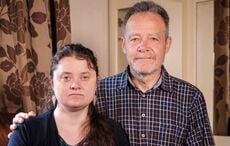Derry Girls, in just two seasons, has become a critically-acclaimed show. But does it do right by the people of Northern Ireland?
Commissioned by Channel 4 in the UK but available internationally via Netflix, ‘Derry Girls’ follows a group of teenage girls (and their wee English fella pal) through their teenage lives which are fairly typical, save for the fact that they are in height of The Troubles in 1990s Northern Ireland.
Read More: Get ready! Derry Girls season 2 arrives on US Netflix this week
Teenage hijinx during The Troubles? It's safe to say that 'Derry Girls' could have been a total misfire, and the reception could have gone cold. But it wasn't, and it hasn't.
Irish News reports that the show's second season premiere had 1.8 million overnight viewers, which was 200,000 more than the 1.6 million viewers who tuned in for the January 2018 debut.
On Rotten Tomatoes, the first season has a 100 percent rating, with the second season a strong 96 percent rating.
At the culmination of the show's first season, Lisa McGee, the Derry native who wrote and created the show, said: "It’s particularly special to me that the Northern Irish audience has supported it in the way that they have – I’ve been blown away by the response to the series and am so excited that we get to do it all again with the second series.”
While some, and they appear to be in the vast minority, turn their noses up at the thought of comedy being displayed side-by-side with The Troubles, most people either from Northern Ireland or with connections to the region believe the show hits the nail on the head.
If the viewership and critical acclaim the show has enjoyed in its relatively brief lifespan isn't enough, the people of Northern Ireland have been equally enthused in their reactions.
"Rolled with it"
Writing for Vulture, Nate Jones, whose father, a native of England who spent some of his teen years living as a Protestant in Derry City, says his relatives feel the show is true in its depiction of the ear.
Of the "bombs and barricades" that defined the era, Jones's aunt Mary, who attend the secondary school that was the inspiration for the school on the show, says: “You just kind of rolled with it."
"There was nothing else you could do. It made people maybe a wee bit reckless. They were in a hurry to have their life right now — don’t wait. You would expect that everything would be suspended and people would do nothing. But it was the opposite. People got into life, really took it by the throat.”
A wee bit reckless and taking life by the throat? Sounds just like our group of teens on 'Derry Girls.'
Read More: Derry Girls season two premiered last night in Ireland to rave reviews
"Refreshing" and "Reflective of reality"
Writing for Mashable, Rachel Thompson, whose parents are both from Northern Ireland, said: "I find it refreshing to see on-screen representations of Northern Irish women that are reflective of reality."
“The Northern Irish women in my immediate and extended family are strong, confident, and assertive women. Women who commanded respect (but who, I'll admit, I was ever so slightly scared of when I was a kid). But these women all share one rather brilliant trait — their sharp sense of humor. That's why it's long been a frustrating thing to see on-screen depictions of Northern Irish women that don't show this important aspect of their personalities."
Thompson adds, "Like my mother Nancy, who's from Larne, told me: ‘Norn Irish women are warriors.’”
Turns out, as Thompson learned, McGee's decision not to make her subjects "victims" was no accident. She said during a q&a session: "That has always annoyed me so much because the women in Northern Ireland and Irish women are so funny."
"They're always victims, always victims of something to do with the political situation or the Catholic Church. Those stories are dead important and we need to see them and hear them, I just think there needs to be joy as well.”
"We need to be allowed to tell the stories that other people from around the world are allowed to tell."
Read More: 'Derry Girls' get their own mural in Derry City
And how about going right to the source?
Saoirse-Monica Jackson, who plays Erin Quinn on the hit show, is herself a native of Derry. At 25-years-old, she, of course, would have been particularly young during the height of The Troubles, but she says the show “portrays Derry so well."
Jackson told The Guardian of real-life Derry people: “Yes, we have a harsh sense of humor, and Lisa [McGee] really does go there. People are mental in Derry; they will just tell you exactly what they think.”
“You either laugh or you cry, don’t you? People made a joke about it, and that’s all you can do really.”
Are you a fan of 'Derry Girls'? Share your thoughts in the comments




Comments